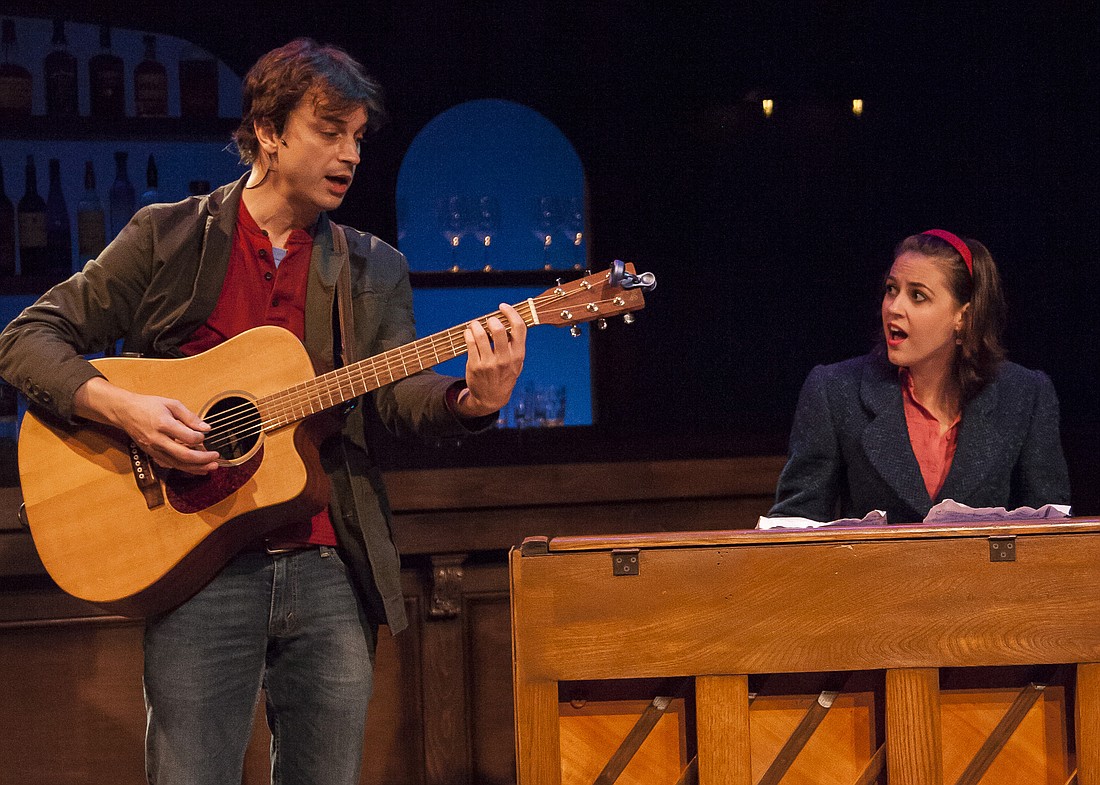- July 26, 2024
-
-
Loading

Loading

“Once” is a love story, but not the story you’d think. It’s a musical play, but not, strictly speaking, a musical. The magic of this play resists easy categories. Whatever you call it, it’s now on stage at Florida Studio Theatre.
The play’s an adaptation of John Carney’s 2007 movie. (Enda Walsh wrote the book; Glen Hansard and Marketa Irglova created the songs.) If you’ve seen the film, you know the plot.
The universe of the play is Dublin, Ireland. A nameless, Irish street musician (aka Guy) leaves his guitar on the street and walks away. Music has failed him, or the other way around. Now he’s ready to stick to his day job: repairing vacuum cleaners. A nameless, Czech piano player/songwriter (aka Girl) asks what the hell he’s doing and drags the story out of him. As fate would have it, she has a busted Hoover! Guy fixes it, and before long, they’re making beautiful music together. At Girl’s relentless insistence, they launch a quest to record a demo CD. They get a ragtag band together and find a recording studio. It costs them every penny they’ve got, but it could be their big break. Or be a big waste of time.
A typical musical tells a story with music. Here, the story’s about making music. “Once” usually has a real-world explanation for the music its characters create. They rehearse, record and sing for their supper, and no suspension of disbelief is required.
This explains why the actors are all musicians. There’s no band backstage or under the stage. The 13 actors are the band, and they’re pretty good.
Ben Williams (last seen as Carl Perkins in FST’s “Million Dollar Quartet”) has a haunting, powerful (and thoroughly American) voice as Guy. He nicely embodies a talented musician who’s uncomfortable in his own skin. Elizabeth Nestlerode is lovable and indomitable as Girl. The irresistible force of her will meets the unmovable object of Guy’s defeated dreams, and she wins. Nestlerode’s force of character sings out in her voice as well. The show’s top-shelf talent also includes the fiddle playing Sarah Hund (of the “Blue Eyed Bettys”); Paul Lincoln as a nervous bank manager/cellist; Emily Mikesell as an accordion playing Czechoslovakian matriarch; Grant Alan Watkins as a heavy-metal drummer; and Chris Blisset as a brawling bar-owner/guitarist. (His bad back defeats his martial arts skills.)
The action unfolds in a Dublin bar — an excellent set by Jeff Dean, even more so because it’s also a working bar. (They invite the audience up for drinks before curtain.) Susan Angermann’s costumes convey a scruffy working class vibe. Thom Beaulieu’s lighting design has a rock concert flair. Naturalistic excuses aside, this is a concert.
You could forget the story and still enjoy the show. Music director Darren Server does an excellent job. Songwriters Hansard and Irglová gave him some excellent Irish folk-rock material to work with. Hansard founded The Frames, after all. That band is entirely comprised of Dublin buskers, which lends street credit to his tunes. Not to shortchange Irglová. She co-wrote “Falling Slowly” with Hansard, and it won an Academy Award.
Director Jason Cannon approaches the play as a love story and keeps you emotionally engaged with its well-drawn characters.
The love of music is the big story, which stands for the love for any art. (Music, architecture, drawing, painting, dance, you name it.) “Once” speaks to the struggle of creative people to hold onto their dreams when the world doesn’t applaud or sign checks. (Fair warning: Minor spoilers ahead.)
The play has a happy ending. Guy and Girl successfully record their demo album. Their music careers are alive and kicking.
Music aside, “Once” is also a Guy-meets-Girl love story. As you’d expect, the duo’s love of music sparks a love for each other. But she’s married and has a child. He still carries a torch for a woman who inspired all his weepy I’ve-Been-Rejected songs.
The play’s structure leads you to expect a payoff, a final clinch when Guy and Girl get together for a big, long smooch. It doesn’t happen.
It’s a gutsy decision, but that’s what keeps it real.
Archetype is very close to cliché. There’s a hair’s breadth of difference, but it makes all the difference.
Art gets a happy ending, love doesn’t.
“Once” charms you and doesn’t lie to you. It’s a great show — and an honest one.